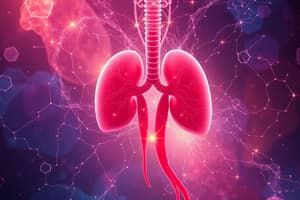Podcast
Questions and Answers
Which of the following best describes the primary cause of most pheochromocytomas?
Which of the following best describes the primary cause of most pheochromocytomas?
- Most often sporadic occurrences (correct)
- Primarily caused by external environmental factors
- Commonly linked to viral infections
- Often inherited as part of a genetic syndrome
What percentage of pheochromocytomas are known to be malignant?
What percentage of pheochromocytomas are known to be malignant?
- 20%
- 10% (correct)
- 15%
- 5%
In individuals with pheochromocytoma, what is the dominant clinical feature that is commonly observed?
In individuals with pheochromocytoma, what is the dominant clinical feature that is commonly observed?
- Persistent weight gain
- Paroxysmal hypertension (correct)
- Hypotension
- Elevated blood glucose levels
Which laboratory findings are expected to be elevated in patients with pheochromocytoma?
Which laboratory findings are expected to be elevated in patients with pheochromocytoma?
What is the recommended treatment method for managing hypertension caused by pheochromocytoma?
What is the recommended treatment method for managing hypertension caused by pheochromocytoma?
What is a primary cause of adrenal hyperfunction?
What is a primary cause of adrenal hyperfunction?
Which diagnostic test is most likely to be elevated in a patient with Cushing's syndrome?
Which diagnostic test is most likely to be elevated in a patient with Cushing's syndrome?
Which statements about Addison's disease is correct?
Which statements about Addison's disease is correct?
What is a common clinical feature associated with pheochromocytoma?
What is a common clinical feature associated with pheochromocytoma?
What best describes the pathophysiology behind Conn's disease?
What best describes the pathophysiology behind Conn's disease?
In congenital adrenal hyperplasia, what is typically decreased?
In congenital adrenal hyperplasia, what is typically decreased?
In adrenal insufficiency, which hormone is most commonly deficient?
In adrenal insufficiency, which hormone is most commonly deficient?
Which term describes dysfunction originating from the pituitary gland?
Which term describes dysfunction originating from the pituitary gland?
What characterizes primary aldosterone receptor resistance (ARR)?
What characterizes primary aldosterone receptor resistance (ARR)?
Which enzyme deficiency is most commonly associated with congenital adrenal hyperplasia (CAH)?
Which enzyme deficiency is most commonly associated with congenital adrenal hyperplasia (CAH)?
What is a significant consequence of salt-wasting congenital adrenal hyperplasia?
What is a significant consequence of salt-wasting congenital adrenal hyperplasia?
What condition do late-onset CAH symptoms in women often mimic?
What condition do late-onset CAH symptoms in women often mimic?
What is the impact of classical simple virilizing CAH on male infants at birth?
What is the impact of classical simple virilizing CAH on male infants at birth?
What laboratory result is commonly assessed in diagnosing congenital adrenal hyperplasia?
What laboratory result is commonly assessed in diagnosing congenital adrenal hyperplasia?
What is a common effect of adrenal hyperplasia due to enzyme deficiency?
What is a common effect of adrenal hyperplasia due to enzyme deficiency?
Which of the following symptoms is associated with non-classic congenital adrenal hyperplasia?
Which of the following symptoms is associated with non-classic congenital adrenal hyperplasia?
How is Cushing’s disease distinguished from other forms of ACTH-dependent Cushing's syndrome based on a high dose dexamethasone suppression test?
How is Cushing’s disease distinguished from other forms of ACTH-dependent Cushing's syndrome based on a high dose dexamethasone suppression test?
Which condition is characterized by an adrenal gland that is smaller than normal?
Which condition is characterized by an adrenal gland that is smaller than normal?
What common condition results from aggressively withdrawing glucocorticoids, potentially leading to acute adrenal insufficiency?
What common condition results from aggressively withdrawing glucocorticoids, potentially leading to acute adrenal insufficiency?
What is the expected cortisol level in a patient with an adrenal adenoma during a suppression test?
What is the expected cortisol level in a patient with an adrenal adenoma during a suppression test?
Which of the following describes a tumor that is responsible for ectopic ACTH-dependent Cushing's syndrome?
Which of the following describes a tumor that is responsible for ectopic ACTH-dependent Cushing's syndrome?
Which condition is characterized by an acute adrenal crisis due to stress on atrophic adrenal glands?
Which condition is characterized by an acute adrenal crisis due to stress on atrophic adrenal glands?
What is one of the major etiologies that can cause acute adrenal insufficiency in newborns?
What is one of the major etiologies that can cause acute adrenal insufficiency in newborns?
In patients with Addison Disease, which of the following is NOT a clinical manifestation until at least 90% of the adrenal cortex is compromised?
In patients with Addison Disease, which of the following is NOT a clinical manifestation until at least 90% of the adrenal cortex is compromised?
Which of these disorders is considered the most common cause of Addison Disease worldwide?
Which of these disorders is considered the most common cause of Addison Disease worldwide?
What characterizes secondary adrenal insufficiency compared to primary adrenal insufficiency?
What characterizes secondary adrenal insufficiency compared to primary adrenal insufficiency?
Which syndrome involves acute adrenal hemorrhage following bacterial infection?
Which syndrome involves acute adrenal hemorrhage following bacterial infection?
What test is used to check for an ACTH deficiency in suspected secondary adrenal insufficiency?
What test is used to check for an ACTH deficiency in suspected secondary adrenal insufficiency?
What is a significant risk factor for precipitating an adrenal crisis in patients on corticosteroid therapy?
What is a significant risk factor for precipitating an adrenal crisis in patients on corticosteroid therapy?
Which finding is commonly absent in secondary adrenal insufficiency that distinguishes it from primary conditions?
Which finding is commonly absent in secondary adrenal insufficiency that distinguishes it from primary conditions?
What common physical symptom may result from adrenal insufficiency due to low corticosteroid levels?
What common physical symptom may result from adrenal insufficiency due to low corticosteroid levels?
What is the most common autoimmune disorder leading to Addison Disease in developed countries?
What is the most common autoimmune disorder leading to Addison Disease in developed countries?
Which of the following scenarios exemplifies when an adrenal crisis might occur?
Which of the following scenarios exemplifies when an adrenal crisis might occur?
What is one of the laboratory findings expected in primary adrenal insufficiency?
What is one of the laboratory findings expected in primary adrenal insufficiency?
What condition develops when the adrenal glands decrease in size and are ineffective in glucocorticoid production?
What condition develops when the adrenal glands decrease in size and are ineffective in glucocorticoid production?
Which of the following conditions may result from significant destruction of adrenal cortex without active autoimmune processes?
Which of the following conditions may result from significant destruction of adrenal cortex without active autoimmune processes?
Flashcards are hidden until you start studying
Study Notes
Adrenal Pathologies
- Cushing's Syndrome: An umbrella term for disorders involving hypercortisolism.
- Hypercortisolism: Elevated cortisol levels.
- Secondary Hypercortisolism: Common cause of hypercortisolism; dysfunction at the pituitary gland.
- Cushing's disease: Tumour within the pituitary gland, results in high ACTH levels, high cortisol levels, and suppression in the dexamethasone suppression test.
- Adrenal Adenoma: Benign tumour in the adrenal glands; high cortisol levels, low to normal ACTH levels, doesn't suppress in the dexamethasone suppression test.
- Paraneoplastic Syndrome: Cancerous tumour in the lung or kidneys, results in high ACTH and cortisol levels, doesn't suppress in the dexamethasone suppression test.
- Adrenocortical Insufficiency: Reduced function of the adrenal cortex, can be primary or secondary.
- Primary Adrenocortical Insufficiency: Dysfunction within the adrenal gland itself, decreased cortisol production.
- Secondary Adrenocortical Insufficiency: Dysfunction at the pituitary gland, reduced ACTH production leading to decreased cortisol production.
- Acute Adrenocortical Insufficiency (Adrenal Crisis): A life-threatening emergency caused by sudden stress or withdrawal of corticosteroids, characterized by hemodynamic instability, abdominal pain, nausea, vomiting, fever, hypoglycemia, hyponatremia, and decreased consciousness.
- Chronic Adrenocortical Insufficiency (Addison's Disease): Progressive destruction of the adrenal cortex, 90% of the cortex must be destroyed for symptoms to manifest. Most commonly caused by autoimmune destruction, tuberculosis, AIDS, sarcoidosis or malignancy.
- Congenital Adrenal Hyperplasia (CAH): An autosomal recessive disorder caused by enzyme deficiency in the cortisol synthesis pathway, most commonly 21-hydroxylase deficiency.
- Classic CAH: Affects newborns.
- Salt-wasting: Complete inactivation of 21-hydroxylase, causing mineralocorticoid deficiency, hyponatremia, hyperkalemia, dehydration, hypotension, and increased renin secretion.
- Simple Virilizing: Significantly reduced function of 21-hydroxylase, causing virilization in female infants.
- Non-classic CAH: Milder form, presenting later in childhood or adulthood caused by partial deficiency in 21-hydroxylase, often mimicking PCOS in women.
- Pheochromocytoma: Rare tumour of chromaffin cells, most often secreting catecholamines.
- Hypertension: Dominant clinical feature of Pheochromocytoma, often paroxysmal and exacerbated by stress or posture changes.
- Insulin Tolerance Test: Used to evaluate ACTH and cortisol secretion in secondary adrenocortical insufficiency.
- CRH Test: Evaluates ACTH and cortisol secretion in secondary adrenocortical insufficiency.
- Aldosterone: Renin Ratio (ARR: Used to differentiate primary (high aldosterone, normal renin) and secondary (high aldosterone, high renin) hyperaldosteronism.
- 17-hydroxyprogesterone (17-OHP) Levels: Elevated in congenital adrenal hyperplasia.
- Serum ACTH: Elevated in Cushing's disease, decreased in primary adrenal insufficiency.
- Cortisol Testing: Used to evaluate adrenal function, including 24-hour free urine cortisol and serum morning cortisol.
- Dexamethasone Suppression Test: Used to evaluate ACTH and cortisol levels in Cushing's syndrome.
- Neurologic Imaging (MRI) Useful to assess adrenal glands, pituitary gland or other organs involved in adrenal pathologies.
Key points
- Hypercortisolism can be primary (adrenal gland dysfunction) or secondary (pituitary gland dysfunction).
- Adrenal insufficiency can be primary (adrenal gland dysfunction) or secondary (pituitary gland dysfunction).
- Addison's disease is the chronic form of primary adrenal insufficiency.
- CAH can be classic (affecting newborns) or non-classic (presenting later in life).
- Pheochromocytoma is characterized by paroxysmal hypertension.
- Appropriate laboratory tests are essential for diagnosing adrenal pathologies.
- Management of adrenal pathologies often requires lifelong hormone replacement therapy.
Studying That Suits You
Use AI to generate personalized quizzes and flashcards to suit your learning preferences.




